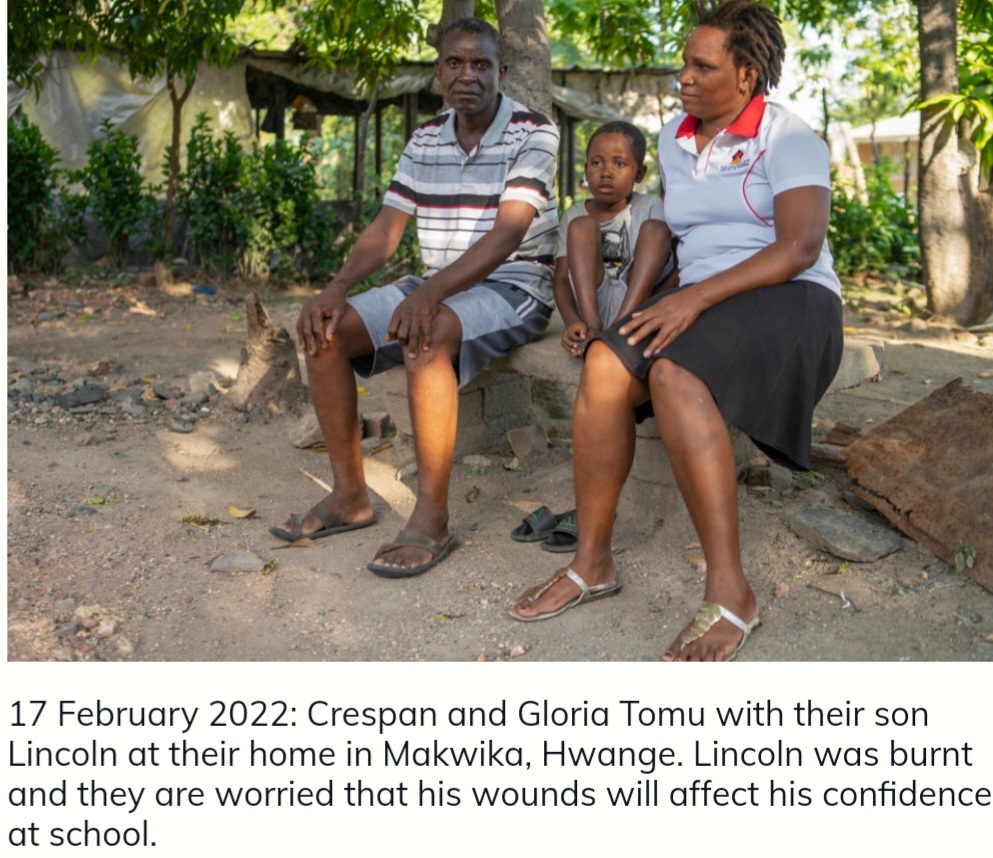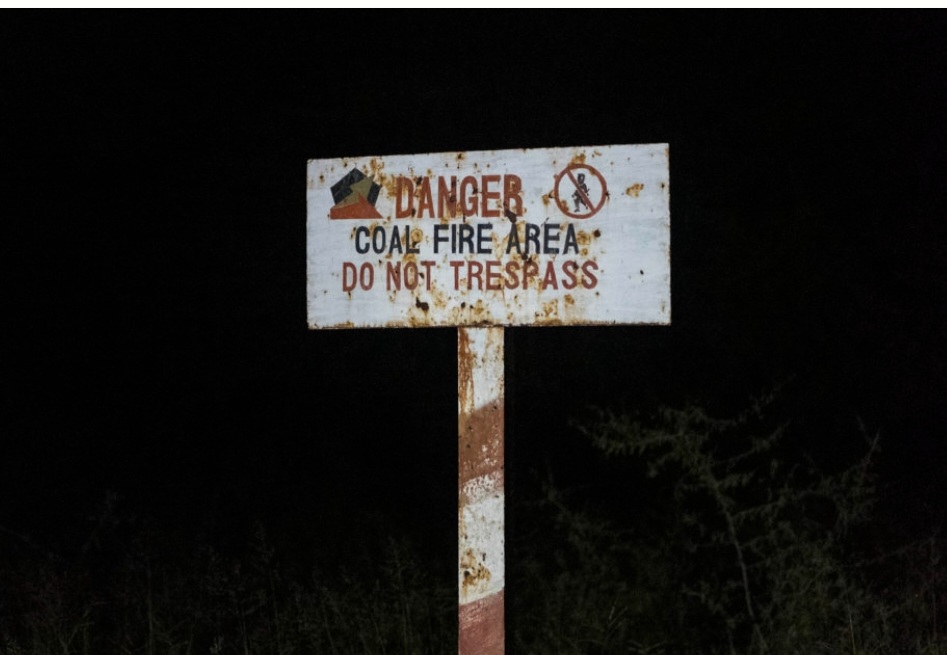BY FARAI SHAWN MATIASHE
PICTURES BY KB MPOFU
Six year-old Lincoln Tomu ambles towards his mother, Gloria Tomu, who is seated on the verandah of their home in Hwange, a town in Matabeleland North province in northwestern Zimbabwe.
It is a stiflingly hot afternoon in February.
Just before reaching Tomu (46), Lincoln starts rubbing the itchy burn scars that are visible on his lower legs and feet.
“This is what my son is going through. He is in trouble,” says Tomu, holding back her tears.
Her son was burnt in an underground coal seam fire in September 2021 while with his grandmother.
“They did not know that the ground was hot,” says Tomu.
“He stepped into a crack in the road. He got trapped and burnt his legs.
“He was rescued by a Good Samaritan after his grandmother called for help.”
Lincoln, who was in preschool at the time of the incident, was seriously injured and ended up staying in Hwange Colliery Hospital, a public healthcare institution, for two months. He still struggles to walk properly.
This part of Matabeleland North is home to the partly state-owned Hwange Colliery Company as well as seven other coal mining and coking companies.
It is the heart of the coal industry in Zimbabwe.
Clouds of black dust rise into the air each time a heavyweight truck loaded with coal rumbles into the premises of the colliery.
According to the Worldometer website, Zimbabwe had 553 million tonnes of proven coal reserves in 2016.
President Emmerson Mnangagwa and his government aim to have a US$1 billion coal mining industry as part of a US$12 billion mining economy by 2030.
They want to use coal to boost power generation and reduce the constant shortages of electricity that plague the country.

The fire below
Underground coal seam fires have been causing damage and even death in Hwange since late last year throughout the concession area where the colliery operates.
They have been burning for years and cause the ground to be unstable, putting the lives of people, particularly children, and livestock at risk.
Some of the areas have signs warning people of the dangers, but they are of little value if the areas are unfenced.
The Hwange Colliery Company has contracted mining consultants from the global DMT Group to investigate the cause of the underground fires in the town and surrounding areas.
A report is expected later in March.
Most of these coal fires start with the ignition of exposed surface seams, but they can also occur in coal storage or waste piles.
The fires ignite through spontaneous combustion or natural or human activity, and they release toxic fumes.
Those who fall victim to the fires suffer a range of physical and psychological effects, according to a recent report by the Centre for Natural Resource Governance (CNRG), a research and advocacy organisation based in Zimbabwe.
It says some victims are traumatised by near-death experiences or left with permanent disabilities that ruin their lives.
“The children who fall victim to the coal seam fires suffer a range of physical and psychological effects, which include post-traumatic stress disorder,” the report states.
Tomu says she is worried about Lincoln, who was supposed to have been enrolled in the first grade of primary school but could not as he is always rubbing his wounds.
“I feel for him. He is traumatised. He cannot put on shoes because of the pain,” she says.
Lives changed and lost
Another survivor from Hwange, Preside Sibanda (17), has stopped going to school because of his burn wounds.
Sibanda was injured in 2020 at a decommissioned mine in Hwange that is now a college.
“I burnt both of my legs when I went to pick mangoes at the old mine.
“I am shy to go to school as fellow students laugh at me because I am always rubbing my itchy legs,” he says.
“If I stand for a long time, I start to feel pain. I miss playing my favourite sport, football, with my friends.”
The coal fires claimed the life of eight year-old Alisha Sekina Musvite in November.
She was swallowed waist-deep by a fire hole at an old dump site in Makwika village, where Tomu and Lincoln also live.
She died just days after both her legs had been amputated.
“Children, by nature, love playing. They are curious, experimental and love adventures,” says Simiso Mlevu, a communications officer at the CNRG.
“Most of the children who have been burnt met their fate while playing with their peers.
“Some of the coal fires are near schools.”
To prevent accidents, the villagers in Hwange have been calling on mining companies to detect underground fires, erect warning signs and fence off the affected areas to keep children out.
Tomu, whose husband works at one of the local mines, says the family reported Lincoln’s injuries to the Hwange Colliery Company and asked for help with his medical bills, but to no avail.
“I used a family medical aid, but I bought some of the medicines required by the doctors myself.
“We reported the matter to the safety manager, but all seems to have fallen on deaf ears.”
Thobekile Shoko, a regional organiser for the National Mine Workers Union of Zimbabwe, says it’s hard to apportion blame for the fires on a single company.
“Hwange as a whole is a coal mining place.
“Where we stay we are told the houses were built on top of the old mines and these fires just appear,” she says.
Shoko says awareness campaigns have been undertaken in schools, but more can be done to prevent accidents and help the victims of these fires.- New Frame

 Slider3 years ago
Slider3 years ago
 National4 years ago
National4 years ago
 Tourism and Environment4 years ago
Tourism and Environment4 years ago
 Opinion4 years ago
Opinion4 years ago
 Special reports4 years ago
Special reports4 years ago
 National4 years ago
National4 years ago
 National3 years ago
National3 years ago
 National3 years ago
National3 years ago




